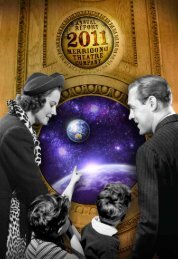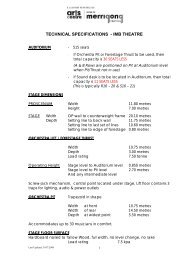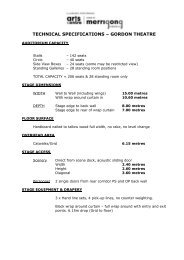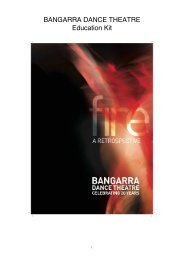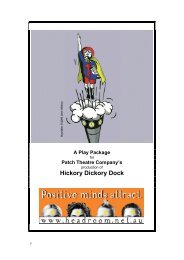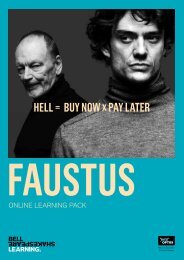UNTRAINED
UNTRAINED - Merrigong Theatre Company
UNTRAINED - Merrigong Theatre Company
- No tags were found...
Create successful ePaper yourself
Turn your PDF publications into a flip-book with our unique Google optimized e-Paper software.
Dance Massive: Untrained<br />
Theatre Notes<br />
March 17 2009<br />
Reviewed by Alison Croggon<br />
Lucy Guerin's Untrained, presented in the dance-friendly space at the Meatmarket, is<br />
another take on command and response. The premise is lucid and simple: four performers,<br />
two trained dancers (Antony Hamilton and Byron Perry) and two untrained (visual artists<br />
Ross Coulter and Simon Obarzanek), are given a series of tasks, which they perform before<br />
an audience. The tasks are listed on pieces of paper laid on the floor, and the performances<br />
take place in a small square outlined in the middle of the stage.<br />
It could be the essence of banality, a merely intellectual examination of the differences<br />
between levels of performative skill. Indeed, before I saw it, I read this withering review in<br />
the Age, which said that the work was simply going over old ground broken in the 1960s,<br />
and that although it was "mildly entertaining", Untrained was "ultimately uninteresting".<br />
Ouch.<br />
After I had seen the show, this struck me as a rather ungenerous response: as with Two-<br />
Faced Bastard, I think you have to work hard to resist the unexpected charm of this show.<br />
But the review prompted me do some reading about the post-modern dance that emerged<br />
in 1960s New York. Post-modern dance evolved in part from the dance of Merce<br />
Cunningham, although it was a reaction to the purities of modern practice. It famously<br />
began with an influential series of performances in the Judson Church Hall in Greenwich<br />
Village in the early '60s. And yes, Jordan Beth Vincent is quite correct: Untrained is indeed<br />
in the same area. Like those performances, this show draws on Dadaist influences, Cagean<br />
randomness and task-based activity, and the vernacular of the everyday, using both trained<br />
and untrained bodies to examine the nature of performance.<br />
Does this mean Guerin is merely reinventing the wheel? Is it naive to find it engrossing? I'm<br />
not so sure. For one thing, you'd have to be absolutely certain that Guerin doesn't know<br />
that the wheel exists in the first place. Myself, I'd be taking bets that she is perfectly aware<br />
of the traditions from which she is drawing. And also, you'd have to ignore the immediacy<br />
of the performances, which engage your attention throughout the show (which seemed a<br />
lot shorter than its 90 minutes). I thought of Borges's story about the man who rewrote<br />
Cervantes' Don Quixote, and his assertion that, although the second text was exactly the<br />
same, word for word, as the original, the newer writing was an entirely different work,<br />
because an entirely different time and series of necessities had brought it to fruition. I think<br />
some- thing similar pertains here. Only more so, because performance only ever exists in<br />
the now.



